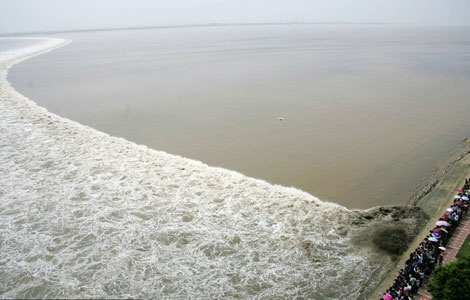China offers example for developing nations
Updated: 2011-09-15 07:47
By Ding Qingfen (China Daily)
|
|||||||||
BEIJING - China is setting a good example for emerging nations on how to achieve economic prosperity and gain influence in global markets, said Sanjay Pradhan, vice-president of the World Bank.
"China's experience is spectacular, growth is spectacular, and that gives inspiration," Pradhan told China Daily on the sidelines of a workshop on international development cooperation and capacity development in Beijing. China can "offer the laboratory, a set of experiences other countries can learn from", he added.
The workshop, organized by the Ministry of Commerce and the World Bank, was intended to provide a platform for many countries to share their experience in capacity development.
Capacity development is a term defined by the World Bank as "the ability of individuals, institutions, and whole societies to solve problems, make informed choices, order their priorities and plan their futures, as well as implement programs and projects, and sustain them over time".
"Capacity development is important so that countries can drive the development process themselves," said Pradhan.
During the past three decades of the reform and opening-up policy, China achieved remarkable growth, surpassing Japan as the world's second-largest economy in 2010 and overtaking Germany as the largest exporter in 2009.
China's rise and growing influence "give a lot of hope in the developing world. Emerging countries can learn from the experience of China or of Brazil, Russia or India, because their experiences are more relevant than those of the West", said Pradhan.
Fu Ziying, vice-minister of commerce, agreed. "China indeed has its unique experience in economic development. We expect to have emerging economies share what we have gained and learn during the process," he said.
China has been committed to this process through offering foreign aid, Fu added.
In 1964, then Premier Zhou Enlai declared the Eight Principles of China's Foreign Aid during a visit to Africa. The principles include helping recipient nations embark on the road of self-reliance and pursue independent economic development. China's foreign aid is not only about building infrastructure, but more importantly, transferring technology.
In the construction of the Tazara Railway between 1970 and 1975, the largest single foreign-aid project China has ever undertaken, the nation provided capital and on-site expert guidance.
During the past two decades of its foreign aid, China prioritized experience sharing, through sending medical teams, holding workshops and establishing agricultural technical cooperation.
The financial crisis that began in late 2008 has slowed the global economy, and debt crises have driven developed economies into the doldrums.
"Food crises, climate change and energy safety impose new challenges for developing nations," said Gao Hucheng, vice-minister of commerce.
"Developing nations must improve their capabilities to cope with these problems."
Lu Dong contributed to this story.
China Daily
(China Daily 09/15/2011 page14)










